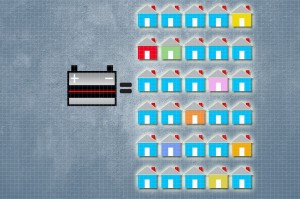 It’s winter. And with that comes heavy coats, icy winds, and occasionally, below freezing temperatures: conditions not favorable for batteries.
It’s winter. And with that comes heavy coats, icy winds, and occasionally, below freezing temperatures: conditions not favorable for batteries.
Car batteries
Temperature extremes, in general, are not favorable to batteries. According to Lifewire, lead-acid batteries drop in capacity by about 20 percent in normal to freezing weather, and down to about 50 percent in temperatures that reach about -22 degrees Fahrenheit.
As a result, you may find your car battery giving out on any given winter morning. This is due to reduced capacity and increased draw from starter motors and accessories. This is because starter motors require a tremendous amount of amperage to get going: knocking out the capacity of even the newest batteries. (more…)


